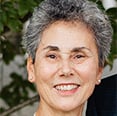Margaret McManus
Associate Provost for Graduate Studies and Professor (Retired); Currently Adjunct Faculty

“I enjoy being able to engage students in learning data concepts and having them bring their own real-world experience. I firmly believe that we benefit from lifelong learning and sharing our knowledge with each other.”
Degrees Held:
- Ph.D. in Computer Information Science – Temple University, 1995
- M.S. in Computer Science – The Pennsylvania State University, 1973
- B.A. in Mathematics – Immaculata University, 1969
Career Highlights:
Administrative Work at La Salle University:
- Associate Provost for Graduate Studies, 2013 - 2015
- Executive Director of Graduate Studies, 2011 - 2013
- Associate Dean, School of Arts and Sciences, 2003 - 2013
- Interim Dean, School of Arts and Sciences, 2001 - 2003
- Associate Dean for Graduate Studies, School of Arts and Sciences, 1998 - 2001
- Director, M.S. in Information Technology Leadership, 2001
- Director, M.S./M.A. in Computer Information Science, 1995 - 2001
Academic Work at La Salle University:
- Part-time Instructor, Mathematics and Computer Science Department, 2015 - present
- Professor, Mathematics and Computer Science Department, 2010 - 2015
- Associate Professor, Mathematics and Computer Science Department, 1997 – 2010
- Assistant Professor, Mathematics and Computer Science Department, 1986 - 1997
- Instructor, Mathematical Sciences Department, 1983 - 1986
- Part-time Instructor, Computer and Information Science Department, 1979 - 1983
- Courses taught include numerous undergraduate and graduate courses in research capstone, collaboration technologies, groupware, networking, programming, databases, instructional technology, expert systems, language design, systems software, computer literacy
Selected Papers:
- McManus, M. and Aiken, R. M. (2016). “Supporting Effective Collaboration” Using a Rearview Mirror to Look Forward.” International Journal of Artificial Intelligence in Education. 26(1): 365-377. https://dblp.org/db/journals/aiedu/aiedu26.html#McManusA16
- McManus, M. and Nosek, J. (2008). Co-guest editors of special issue on “Collaboration Challenges: Bridging the IT Support Gap.” Information Systems Management.
- Impact Factor of ISM is 1.242, a comparison of the number of articles printed by Thomson Reuters and the number of citations these articles receive. ISM is ranked 45/99 in Computer Science, Information Systems journals.
- McManus, M. (2003). ACM SIGROUP Computer Supported Collaborative Learning Focus Area Advisor, SIGGROUP Bulletin, August 2003.
- McManus, M. and Aiken, R. (1995). “Using an Intelligent Tutor to Facilitate Collaborative Learning” in Collis, B. and Davies, G. (Eds.) Innovative Adult Learning with Innovative Technologies (pp. 49-64). Amsterdam: Elsevier.
- McManus, M. and Aiken, R. (1995). “Monitoring Computer-Based Collaborative Problem Solving “. Journal of Artificial Intelligence in Education 6(4), 307-336.
Awards:
- IT Leadership Award, La Salle University, Computer Science Advisory Board, 2017
- IT Achievement Award, Information Technology Exposition and Conference (ITEC) and Eastern Technology Council, Philadelphia, PA, 1999.
Selected Grants:
- NSF Noyce Teaching Fellowships/Master Teaching Fellowships Planning Grant, Principal Investigator (with Co-PIs Stefan Samulewicz and Stephen Downs), 2009.
Which online degree program(s) do you teach?
What do you want students to take away from your classes? What do you want them to learn?
I’d like for them to understand the importance and structure of a well-designed database to obtain meaningful information while ensuring its data security, integrity, social, ethical and privacy usage.
At the end of the course, the student should be able to do the following:
- Analyze a business problem to determine if a database would help with solution of the problem
- Develop a database design based on the results of the business analysis
- Develop a model for the database design
- Implement the database design using a relational database tool
- Prepare questions about the database using the structured query language
- Explain database transaction processes associated with data changes
- Describe the difference between a database and a data warehouse
What qualities make someone particularly successful in the profession in which you teach?
The qualities necessary for one to be successful in data science are numerous and include being able to analyze a problem statement, critique your own and others' designs, solve a problem even if some difficulties arise, work with others on a team both fulfilling your own responsibilities and encouraging team members to fulfill theirs, and communicate clearly and in a timely manner.
Why did you start teaching?
I enjoy being able to engage students in learning data concepts and having them bring their own real-world experience. I firmly believe that we benefit from lifelong learning and sharing our knowledge with each other.
What advice would you give to those considering your online program?
Both the learner and the instructor have responsibilities to make the course a success.
The learner is expected to:
- Complete all readings, view and listen to slide presentations and/or movies and complete weekly activities and assignments for that week
- Participate actively by asking questions
- Contact the instructor immediately if any problems arise that may prevent the learner from completing the weekly requirements
The instructor is expected to:
- Post all course materials and assignments in a timely manner
- Make herself available by email and/or online chat for student questions or concerns
- Check the course regularly and contribute to the online discussion areas
- Provide each learner with timely feedback on their progress in the course
- Grade and return all assignments in a timely manner
What is the one book you think everyone should read?
I think that readers enjoy different genres, but “To Kill a Mockingbird” is a novel which brings timeless lessons in humanity.
Tell us something interesting about yourself that your students may not know.
I enjoy traveling both in the United States and worldwide. I have a goal to visit every continent on earth.